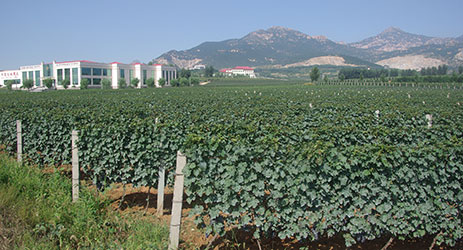One of China’s oldest winemaking regions, Changli County in Hebei Province, is working to rebuild its reputation with billions of yuan in investment following accusations that some producers were making fake wines.

courtesy of the Management Committee Office of Hebei Changli Dry Red Wine Industrial Cluster District
Authorities in Changli are supporting the creation of a special district dedicated to red wine production. It will cover an area of 162 km2 (16,200 ha), with 14.5 km2 for winemaking facilities, according to QI Youchang, head of the Management Committee Office of Hebei Changli Dry Red Wine Industrial Cluster District.
Speaking to DecanterChina.com during the 15th Changli International Wine Festival Summer Events, Qi said the master plan for the district includes five winery cluster areas that focus on grape growing, winemaking, wine tasting and wine tourism. Officials are also encouraging local farmers to build small-scale family-owned wine properties.
Changli County is considered by several experts as the birthplace of the first Chinese red wine, but the area has had a turbulent recent history.
In 2010, state-controlled China Central Television (CCTV) reported that some Changli winemakers were producing fake wines using chemical material, and that others were adding fake labels to bottles.
‘Our wine industry was at a low-point because of [the scandal],’ said QI. ‘Facing the unfavourable situation, Changli profoundly rethought the development of the industry and regulated wine production and management, which led the industry back to a track of healthy development.’
Five wineries have been established so far, including Chateau Huaxia Great Wall of COFCO, family-owned Chateau Gains, and Bodega Langes, which is funded by Austrian entrepreneur Gernot Langes-Swarovski. A further nine wineries are being built with CNY3bn of private company investment. One of China’s largest alcoholic drinks firms, Moutai group, is among the investors and is building a boutique winery in the area.
‘The winery cluster areas will definitely stimulate the wine tourism industry,’ said QI. ‘The experiences of vineyard sightseeing, grape picking, winemaking, tasting, and well-being tourism will increase the value of the regional brand, and improve our city image.’
All rights reserved by Future plc. No part of this publication may be reproduced, distributed or transmitted in any form or by any means without the prior written permission of Decanter.
Only Official Media Partners (see About us) of DecanterChina.com may republish part of the content from the site without prior permission under strict Terms & Conditions. Contact china@decanter.com to learn about how to become an Official Media Partner of DecanterChina.com.


Comments
Submit